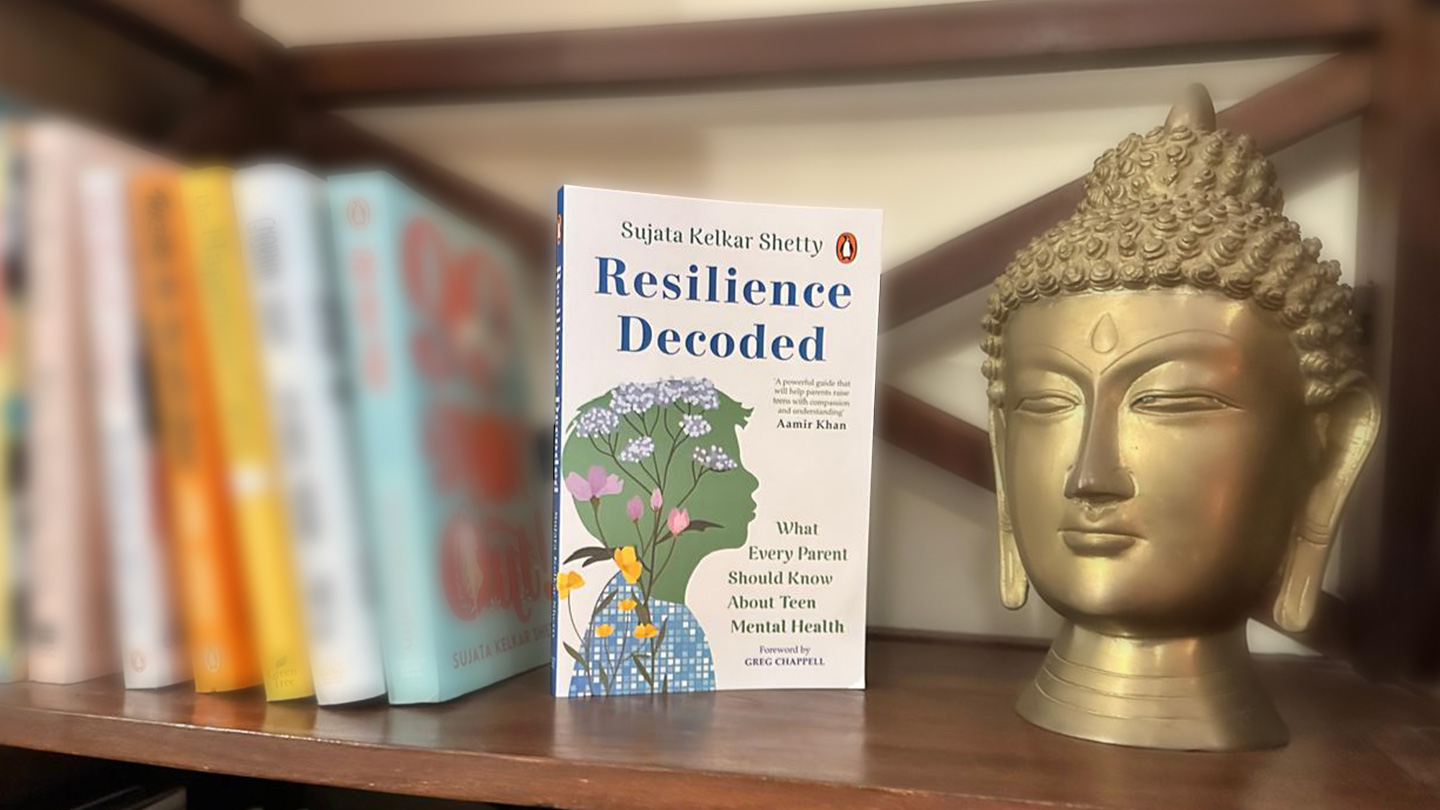Mental Health
Resilience Decoded: Sujata Kelkar on Parenting Teens, Emotional Strength, and the “Ferrari Brain”
Sujata Kelkar Shetty shows parents how to build resilience in teens without losing themselves. Dive into this insightful conversation as we understand “Resilience Decoded”.

In a world where teenagers face unprecedented challenges, from pandemic-induced isolation to the constant exaggeration of achievement culture, resilience has become a critical survival skill. Dr. Sujata Kelkar, researcher, columnist, and mother of two teenage boys, explores this in her new book - Resilience Decoded: What Every Parent Should Know About Teen
Mental Health, a groundbreaking guide on parenting teenagers with empathy, science, and wisdom.
With a foreword by cricket legend Greg Chappell and endorsed by actor Aamir Khan, the book offers parents and educators practical strategies to build resilience in teens, without slipping into helicopter parenting or performance pressure. In this exclusive conversation with UR.Life, Sujata shares her journey and the insights that shaped her work.
Related Story: 5 Strategies to Maintain a Healthy Bond With Your Teenage
You’re a researcher, author, and mother of two, constantly shifting between roles. Can you take us back to your first real encounter with resilience?
“My resilience journey began during my PhD in the US, where isolation and unrelenting pressure spiralled into anxiety and depression. Back then, I mistook my suffering for fatigue, a ‘tax of ambition.’ The real lesson came later, as a new mother navigating a transcontinental move (Washington to Delhi to Mumbai to Bengaluru in two years). Stress, I realized, is a cunning architect, it builds labyrinths fastest in those genetically predisposed. Without social support, escape feels impossible. My second reckoning taught me resilience isn’t inherited; it’s forged through therapy, science, and small acts of self-care like guarding sleep like a sacred covenant or banishing gluten to end chronic migraines.”
From that first encounter to now writing Resilience Decoded, what unfolded along the way? What became the deeper purpose behind this book?
“This book is the culmination of my triple lens: scientist, writer, and mother. At the NIH (National Institute of Health), I studied how stress tinkers with immunity. As a columnist, I translated complex science into actionable wellness advice. But it was parenting teens through a pandemic, watching their world shrink to screens, that crystallized my mission. The book blends interviews with psychologists, educators, and teens, plus my own stumbles as a ‘recovering helicopter parent.’ The deeper purpose? To equip families with tools to transform pain into purpose.”
This book focuses specifically on teenagers. Why did you choose this age group?
“Adolescence is a biological paradox: a brain primed for learning but vulnerable to reckless choices. My sons, now teens, live this daily. One moment they debate climate policy; the next, they’re impulsive. The pandemic amplified this fragility and 32 crore Indian students faced isolation, with 1 in 3 reporting depression. This isn’t just academic; it’s personal. Like all parents, I’ve whispered you are enough into the roar of achievement culture, knowing resilience could be their lifeline.”
Related Story: Conflict Resolution for Teens: Turning Conflict into Connection
As a scientist, author, and mom, how have these roles collided in shaping your view of resilience?
“Science says teens need risk to grow; mom instincts say, ‘Bubble-wrap them!’ This tension sharpened my book’s advice. For example, research shows frontal lobes aren’t fully wired until the mid-20, so I’d remind myself, his brain can't be adult yet, when my son forgot chores. The edge? Real-world testing. Strategies like the ‘24-hour cooling period’ before big decisions emerged from dinner-table debates with my boys.”
Have you ever slipped into helicopter mom mode?
“Oh, I’ve hovered! Early on, I micromanaged homework until a teacher noted, ‘He needs to own his failures.’ Now, I use the ‘5-minute rule’: listen fully before asking, ‘Want my advice or just empathy?’ Teens often need a sounding board, not solutions.”
I really love the term Ferrari brain to describe the teenage mind. How do you decode this contrast of brilliance and fragility?
“The metaphor captures teens’ brilliance and fragility. Their amygdala (emotional engine) revs at full throttle, while the prefrontal cortex (brakes) is still under construction. This explains why they can ace a debate yet impulsively text while driving. The key? Channel that horsepower, encourage debate teams, not daredevil stunts.”
Related Story: Between Selfies and Scores: The Social Struggles of Teens Today
What’s one key insight about teenagers that parents often miss?
“Their brains are 80 per cent mature. The missing 20 per cent (frontal lobes) governs impulse control. So when they swear they’ll ‘remember next time,’ it’s not laziness but their neural wiring literally can’t yet. Repeat lessons patiently; their brains are work-in-progress.”
If there was one line that sums up the book, what would it be?
“Teens aren’t fragile, they’re work-in-progress. This is the manual.”
Could you share a small excerpt from the book for our readers?
A Letter to Fellow Parents:
Dear Parent,
To raise a child in today’s world is to stand in quiet opposition to it. You are not merely feeding, clothing and schooling a teenager. You are shaping a mind that must stay clear in a fog of half-truths, a heart that must remain soft in a culture that rewards hardness and a body that must endure both pressure and pace. It is a task as ordinary as it is radical. Let us speak plainly. There is no manual. No formula. No perfect parent. There are only people—tired, worried, hopeful—doing their best each day to raise someone who will survive with integrity and, perhaps, offer some to the world. What you are doing matters. Quietly refusing the cult of perfection. Turning away from performance parenting. Choosing conversation over commands. This is not weakness—it is moral courage. And it leaves marks that no
certificate ever could. You cannot shield your child from the world. But you can prepare them to meet it without losing themselves. You can teach by example: how to suffer without bitterness, how to fail without collapse, how to think when everyone is shouting. Parenting is not a series of grand gestures. It is the daily work of presence. Of showing up even when ignored. Of setting limits without anger. Of offering safety without condition. This is not easy. But it is enough. In the end, your child will not remember all that you said. But they will remember the ground they stood on—and whether it held steady when they could not.
Hold the line. You are not alone.
Posted with permission from the author
Publishing House: Penguin Random House India
With Resilience Decoded, Sujata Kelkar offers more than a parenting guide; she gives parents, teachers, and caregivers a blueprint for raising emotionally strong, mentally healthy teenagers in an age of chaos. The book launches on September 7th but you can also pre-book and dive into this insightful read.
We see you! Get exclusive access to the best parenting advice from experts. Sign up today.
EXPLORE MORE
If your calendar is packed but your mind feels scattered, it’s time to schedule days that not only keep you busy but also keep you balanced. Here are five kinds of days worth protecting, every single month.
How the unholy trinity of stress, sleep loss, and sugar is quietly rewriting India’s health story.
Quick, smart, and easy to apply moves you can do when panic looms, turn the ‘Oh no’ into ‘okay, I got this!’
Trauma doesn’t just live in your memories; it lives in your brain and body. That’s why telling someone to move on isn’t just unhelpful; it’s biologically inaccurate.








.jpg)


.jpg)
